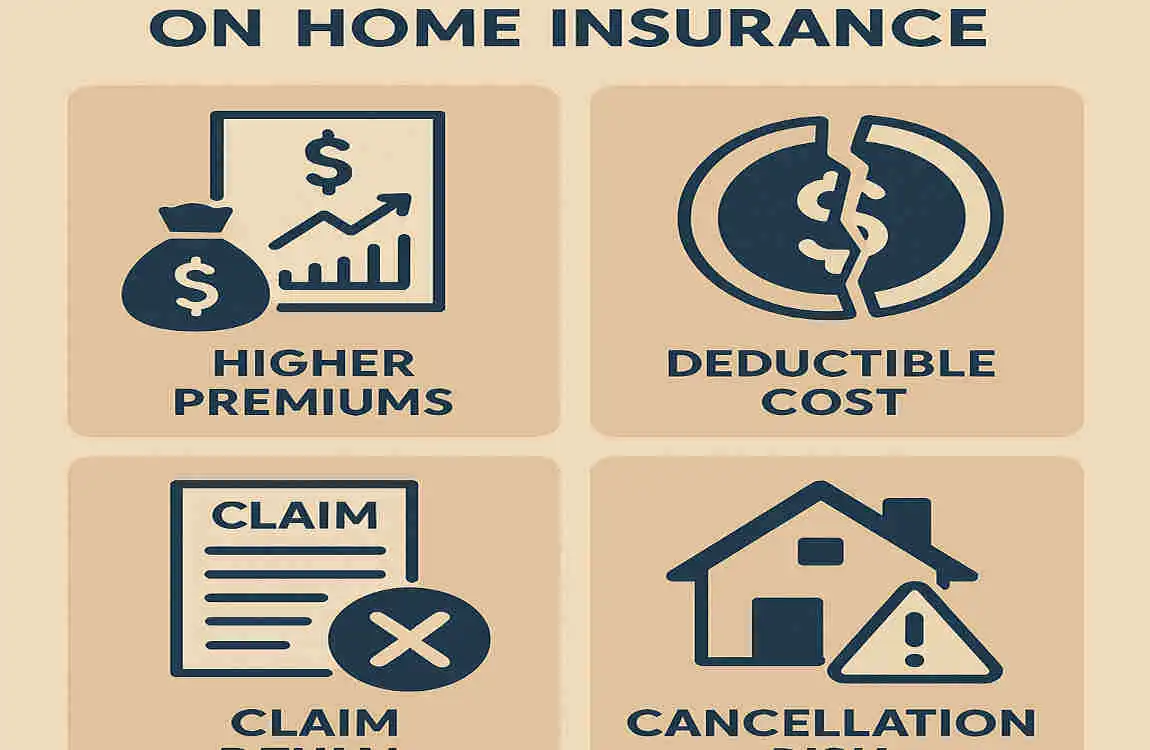Home insurance is a financial safety net that protects homeowners from the unexpected. Whether it’s damage to your property, theft, or liability issues, having home insurance can provide peace of mind. But when misfortune strikes and you face repairs or losses, one big question looms: Is it worth claiming on home insurance?
What Is Home Insurance and How Does It Work?

Home insurance is a contract between a homeowner and an insurance company that provides financial protection for the homeowner’s property and belongings. If your home or possessions are damaged, destroyed, or stolen, your insurance policy can help cover the associated costs.
Types of Coverage Typically Included
Most home insurance policies include several key types of coverage:
- Dwelling Coverage: Protects the structure of your home from damage caused by events such as fire, storms, or vandalism.
- Personal Property Coverage: Covers your belongings, such as furniture, electronics, and clothing, if they’re damaged or stolen.
- Liability Coverage: Provides protection if someone is injured on your property and you’re found legally responsible.
- Additional Living Expenses (ALE): Helps cover costs like hotel stays and food if your home becomes uninhabitable due to a covered event.
How the Claim Process Works
When you experience damage or loss, the claims process typically involves these steps:
- Report the Incident: Notify your insurance company about the event, whether it involves a burst pipe or theft.
- Assessment: An adjuster evaluates the damage and determines how much the insurer will cover.
- Repairs or Reimbursement: Depending on the policy, you may be eligible to receive funds to repair the damage or replace lost items.
The Pros of Claiming on Home Insurance

Claiming on your home insurance can offer several benefits, especially in situations where the damage or loss is significant. Let’s dive into the advantages.
Financial Protection Against Costly Repairs
One of the most significant benefits of home insurance is the financial relief it offers. Repairs from disasters like fires, floods, or severe storms can cost thousands of dollars. Insurance can help cover these expenses, sparing you from having to dip into your savings.
For example:
- Fire Damage: If a fire destroys part of your home, rebuilding costs can be astronomical.
- Water Leaks: Fixing water damage from a burst pipe or roof leak often requires extensive repairs, which insurance can help cover.
Peace of Mind in Emergencies
Knowing you have insurance can ease your stress during difficult times. When disaster strikes, you don’t have to panic about how you’ll afford repairs or replacements. This peace of mind is invaluable, especially in emergencies.
Full or Partial Reimbursement for Damages
Home insurance can either fully or partially reimburse you for damages, depending on your policy. This is particularly helpful in cases of theft or large-scale damage.
For instance:
- If a burglary results in the loss of thousands of dollars’ worth of electronics, your insurance may help cover the cost of replacement.
- If a storm damages your roof, insurance can cover repair costs.
Access to Expert Assessment and Repairs
Most insurance companies work with experienced adjusters and professionals to assess the house damage and recommend repairs. This ensures that:
- You’re not overpaying for repairs.
- The job is done by trusted contractors.
Maintaining Home Value
Neglecting necessary repairs can lead to further deterioration of your property. By claiming on your home insurance and addressing damages promptly, you help maintain the value of your home.
Legal Protection Benefits
If someone gets injured on your property and sues you, your liability coverage can help cover legal fees, medical expenses, or settlements. This protection can save you from severe financial strain.
Real-Life Example of a Positive Claim Outcome
Imagine a homeowner whose house kitchen suffered extensive fire damage. The insurance claim covered the costs of rebuilding the kitchen, replacing appliances, and even temporary relocation expenses. Without insurance, this homeowner would have faced overwhelming financial pressure.
The Cons of Claiming on Home Insurance

While there are clear benefits to filing a claim, homeowners should also carefully consider the potential downsides.
Premium Increases After Claims
One of the most common drawbacks of filing a claim is the possibility of increased premiums. Insurance companies view claims as a risk indicator. Even a single claim can lead to higher rates during your next renewal.
- For example, if you file a claim for water damage, the insurer may raise your premium by 10-20% or more.
- Multiple claims within a short period can lead to even steeper increases.
Possible Claim Denial Risks
Not all claims are approved. Insurance companies may deny claims for several reasons, such as:
- Damages caused by events not covered under your policy (e.g., floods in a standard policy).
- Lack of proper maintenance leads to damage.
Impact on No-Claims Bonus and Discounts
Many insurers reward homeowners with discounts for not filing claims over a specific period. Filing a claim could result in losing this no-claims bonus, increasing your overall costs.
Deductibles and Out-of-Pocket Costs
Before your insurance coverage kicks in, you must pay the deductible. In some cases, the cost of repairs may only slightly exceed your deductible, making a claim less worthwhile.
For example:
- If your deductible is $1,000 and the house repair costs $1,200, you’ll only receive $200 from the insurer.
The Hassle and Time Consumption of the Claims Process
Filing a claim isn’t always straightforward. It involves paperwork, inspections, and waiting for approvals. For some, the hassle and time spent navigating the process may outweigh the benefits.
Potential Depreciation of Insurance Market Value
Filing multiple claims can make you a high-risk customer, potentially leading to higher premiums or even difficulties finding affordable coverage in the future.
Scenarios Where It’s Better to Avoid Claiming
For minor damages, such as small cosmetic issues or inexpensive repairs, it’s often better to pay out of pocket rather than file a claim. This avoids premium increases and keeps your no-claims bonus intact.
Negative Claim Experience Example
A homeowner filed a claim for minor water damage, only to have their premium increase by 15% the following year. In hindsight, they regretted filing the claim, as the repair cost was only slightly above the deductible.
Is It Worth Claiming on Home Insurance? Key Factors to Consider

Deciding whether to file a claim depends on several factors.
Severity and Cost of Damage
Assess the cost of repairs compared to your deductible and the potential premium increase. If the expense is minor, self-funding may be a better option.
Review Your Policy Terms
Understand your policy’s coverage limits, exclusions, and deductible. This will help you determine whether the claim is worth pursuing house.
Long-Term Financial Impact
Consider the long-term impact on your premiums. A small claim today might cost you more in higher premiums over time.
Timing and Frequency of Claims
If you’ve made multiple claims recently, filing another one could result in you being classified as a high-risk customer. Be strategic about when to file.
When a Claim Is Beneficial
- Significant damages (e.g., fire, storm, or total loss).
- Liability claims involving injuries on your property.
When It’s Better to Avoid Claiming
- Minor damages or cosmetic repairs.
- When the repair cost is only slightly above your deductible.
Practical Tip: Consult an Insurance Advisor
If you’re unsure, consult an insurance advisor to weigh the pros and cons of filing a claim.
Tips to Maximize Home Insurance Benefits Without Negative Consequences

Here are some tips to make the most of your home insurance while minimizing risks:
- Keep Detailed Records: Take photos of your property and keep receipts for high-value items.
- Understand Your Policy: Know what’s covered and excluded to avoid surprises.
- Maintain Your Home: Regular upkeep can prevent damage and reduce the need for claims.
- Report Claims Promptly: Delays can complicate the process.
- Negotiate with Insurers: Don’t hesitate to discuss settlements or seek second opinions.
- Consider Additional Coverage: For high-risk areas, supplemental policies (e.g., flood insurance) can provide extra protection.
FAQ: Is It Worth Claiming on Home Insurance?
When Should I Consider Claiming on My Home Insurance?
Significant Damage
If your home has suffered significant damage, such as from a fire, flood, or major storm, it’s usually worth filing a claim. The cost of repairs or replacement can quickly add up, and insurance can help cover these expenses.
Liability Issues
If someone is injured on your property and you’re held liable, your home insurance can cover medical expenses and legal fees. In such cases, filing a claim is often necessary.
Theft or Vandalism
If you’ve experienced theft or vandalism, and the value of the stolen or damaged items exceeds your deductible, it’s worth considering a claim.
When Might It Not Be Worth Claiming on Home Insurance?
Minor Damage
For minor damages where the repair cost is less than your deductible, it might not be worth filing a claim. You’ll end up paying out-of-pocket anyway, and it could impact your future premiums.
Frequent Claims
Filing multiple claims within a short period can lead to higher premiums or even policy cancellation. If you’re a frequent claimant, insurers may view you as a higher risk.
Impact on Premiums
Even a single claim can sometimes lead to increased premiums at renewal time. Weigh the cost of the claim against potential future increases in your insurance costs.
What Should I Consider Before Filing a Claim?
Review Your Policy
Understand your policy’s coverage, deductibles, and exclusions. Some damages might not be covered, so it’s crucial to know what you’re entitled to.
Document the Damage
Take photos and videos of the damage, and keep receipts for any immediate repairs or temporary housing. This documentation will be essential for your claim.
Calculate the Cost
Estimate the total cost of repairs or replacement. If it’s close to or less than your deductible, it might not be worth filing a claim.
Consider Future Implications
Think about how a claim might affect your insurance rates in the future. Sometimes, paying out-of-pocket for minor damages can save you money in the long run.
How Can I Minimize the Impact of a Claim on My Premiums?
Shop Around
After a claim, compare quotes from different insurers. You might find a better rate elsewhere.
Improve Your Home’s Safety
Installing safety features like smoke detectors, security systems, or storm shutters can sometimes lower your premiums.
Bundle Policies
Combining your home insurance with other policies, like auto insurance, can often lead to discounts.
Increase Your Deductible
Opting for a higher deductible can lower your premiums, but make sure you can afford the higher out-of-pocket cost if you need to file a claim.
What If My Claim Is Denied?
Review the Denial Letter
Understand the reasons for the denial. It might be due to policy exclusions, insufficient documentation, or other factors.
Appeal the Decision
If you believe the denial was unjust, you can appeal the decision. Provide additional documentation or clarify any misunderstandings.
Seek Professional Help
Consider hiring a public adjuster or an attorney specializing in insurance claims to help you navigate the process.




